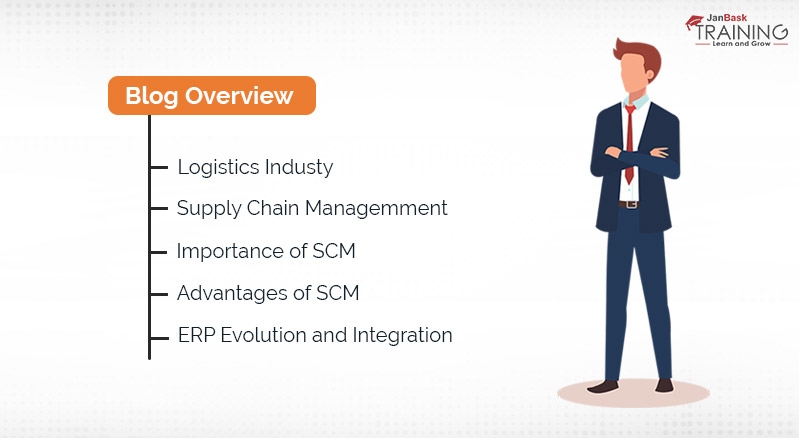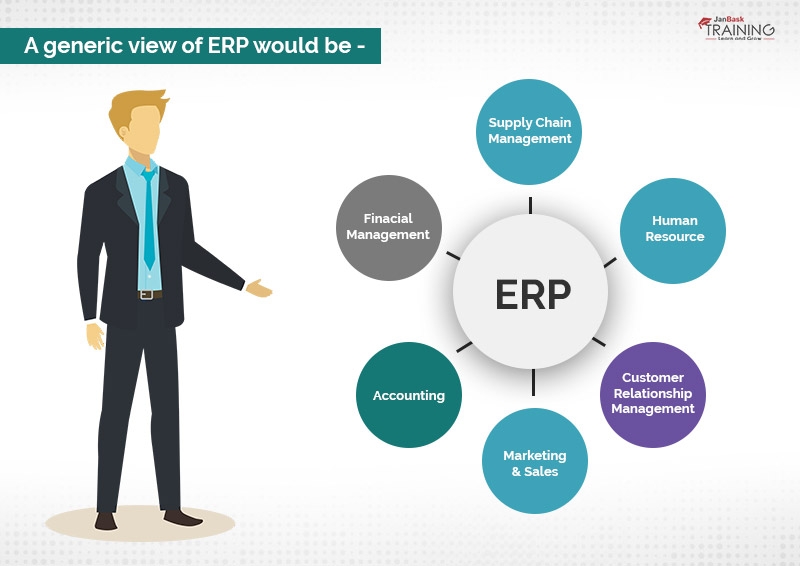11
JulInternational Womens Day : Flat 30% off on live classes + 2 free self-paced courses - SCHEDULE CALL
The supply chain is all about the logistics and the network flow that move around for the organizations. Whether you are the business owner of the expanding company or a new bird in the market, its success is dependent on the truth of how effective its supply chain is working throughout. This industry drives business by numbers, and business analysts role in supply chain management should be given to one who is perfect with numbers and statistics.
Organizations with worldwide stockpile chains—a classification that incorporates a quickly developing number of enterprises, medium-sized organizations, and even independent companies—can be remaining on a cost base of which 90% is inferable from production network use.

Any industry and domain is very vast, and so are its defined responsibilities for each role aligned for that domain. As though the core principles of any domain remain the same, but the application it has on various people aligned gets different. Well, let’s see how the logistics industry works for business analysts or how supply chain management benefits them. The business analysts role in supply chain management is mostly referred to as Logistics Analyst or in a generic way business analyst.
A business analytical expert is liable for directing the whole life pattern of an item, including buy, appropriation, inner allocation, discharge and last leeway of assets. He/She enables their businesses to upgrade execution by deciding and lessening wasteful aspects that may devour benefits. Basically strategic investigators help streamline tasks and distinguish the most ideal approach to utilize the organization's assets to accomplish its objectives. Business analysts and strategic experts as a rule work in an assortment of ventures inside the coordinations division.
Organizations of different types procure full-time coordinations investigators to work in each industry, for the most part during daytime business hours. The business analyst works both freely and in a group situation, fundamentally in the organization business office, and eventually reports to the coordinations chief. This industry also demands supply chain management business analysts to travel to various locations, cross-business or vendors to align the work for the faster movement of business.

Supply chains are the lifesavers of businesses over the globe. The interface the entirety of the procedures required between the assembling and the last conveyance of an item to a shopper. In this way, basically, they are fundamental to almost every monetary framework out there and that’s where their benefits are well utilized by business analysts for the growth of the organization. Nonetheless, these convoluted businesses going around need steady administration and consideration regarding remaining sound and serious. Following are the key supply chain management benefits:
More prominent Efficiency
Inventory network joins item advancement techniques, incorporated coordinations, creation strategies and gauging requests.
Diminished Costs
One of the fundamental advantages of store network the board is its capacity to diminish costs by improving inventories, adjust as indicated by client prerequisites, settling associations with merchants and sellers
Coordinated effort
Another basic advantage of the inventory network is that it means awesome coordination of all the business substances in conveying the last item to your end clients. When there is an absence of correspondence between your merchants or wholesalers, you have no clue what is truly going on.
Expanded Output
At the point when your business can work together better, streamline the entire creation and appropriation process, this straightforwardly means the organization's main concern and improves the general yield
No more Delays
You can meet the clients desires and convey the item to the client in an opportune manner.
Along with the above, there are plenty of other benefits of supply chain management that are understood only when it is actually implemented.
It is important to understand that supply chain management plays an integral role in the success of many businesses. And, as a business analyst, it is equally important to understand that implementation & benefits of supply chain management are essential for an organization’s growth and customer satisfaction.
Diminishes Purchasing Cost – Organizations for the most part incline toward fast dispersions of exorbitant items and crude materials to keep away from costly stock
Decline Production Cost – A solid store network conveys materials to get together plants and keep away from any costs that may happen because of deferrals.
Right amount and quality – Customer anticipates conveyance of the right amount and nature of items.
On-time conveyance – Customers hope to get the right item blend and amount to be conveyed on schedule. A solid store network can help in maintaining a strategic distance from any bottlenecks and guarantee clients get their items in the guaranteed time allotment
Administrations – After deals administrations is one of the significant angles in any business. In the event that any sort of issue happens in the item, the client anticipates that it should be fixed rapidly. A correct store network guarantees that clients get the administration they need.
Supply Chain Management (SCM) is the administration of the progression of merchandise and enterprises and incorporates all procedures that change crude materials into conclusive items. It includes the dynamic streamlining of a business' inventory side exercises to augment client worth and addition of an upper hand in the commercial center.
SCM speaks to an exertion by providers to create and actualize supply chains that are as effective and efficient as could reasonably be expected. Supply chains spread everything from creation to item advancement to the data frameworks expected to coordinate these endeavors.
Business Analysts find the bits of knowledge in the plan of action on which the association is running. These experiences might be identified with income, age, extent of the business, how to support the business, how to diminish spending in the business and so forth. In SCM we manage obtaining crude material, fabricating the item to provide it to the merchandiser/wholesaler.
These procedures should be set up and the association needs to appraise the spending plan for it. By examining the model of the business expert gives the optimized spend examination to these procedures. For instance, in the event that we obtain crude material from a specific seller/area, we can spare this much money against the past.
Another significant thing is foreseeing business patterns. Business investigators will investigate requests of the items in the business area/trader.
Supply chain management business analysts must have the option to manage pressure and can effectively perform various tasks, as their working day is frequently confronted. A great many people right now in an office domain during standard business hours. Inventory network Analysts regularly work as one with the Supply Chain Manager and Planner and Purchasing Manager, answering to the Senior Supply Chain Manager of Director of SCM. The need to ship products over a worldwide market will keep up a requirement for this position, in spite of the fact that the activity development will be slower than for different businesses.
ERP is one of the significant pieces of industry and utilizing it effectively will help in making the business increasingly productive and advance their store network, anyway, ERP didn't come to be unexpected, development of ERP happened in a convenient way and it advanced as time passed lastly came into the structure we know.
It began as a stock control framework in 1960. Taking a gander at how advantageous a PC based database is for ventures and because of Toyota fabricating program Joseph Orlicky created material necessities arranging (MRP) in 1964. The principal organization to utilize MRP was Black and Decker in 1964.
But then it's important to understand what all business analyst do to make this successfully going -
A generic view of ERP would be -

Organizations today have various frameworks all working without a moment's delay. We have programming to run our online virtual customer facing facade. We need to acknowledge requests and installments utilizing the customer-facing facade framework and afterward oversee and satisfy those requests utilizing our ERP. On the off chance that the volume of requests is low, somebody can print a report from the customer-facing facade arrangement of requests got as of late and afterward type those requests into the ERP framework.
We may have a refined framework for item executives. It incorporates explicit concoction plans and firmly oversaw temperature and weight estimations prompting items that coordinate what we promote and what clients need to arrange.
Combination necessities can be outer also. Our client needs to send a high volume of requests and expects such a snappy turnaround we have to naturally incorporate those client orders with our inner ERP request satisfaction frameworks.
As a supply chain management business analyst, you can be in various verticals of SCM or analyze the entire system as a whole. This was the high-level exposure to the SCM domain with supply chain management benefits and contribution of business analysts role in supply chain management and hope you had a great learning experience with us. Happy learning learners.
 Pinterest
Pinterest
 Email
Email
A dynamic, highly professional, and a global online training course provider committed to propelling the next generation of technology learners with a whole new way of training experience.

Cyber Security

QA

Salesforce

Business Analyst

MS SQL Server

Data Science

DevOps

Hadoop

Python

Artificial Intelligence

Machine Learning

Tableau
Search Posts
Related Posts
What Does A Business Intelligence Analyst Expected to Do?
![]() 483.1k
483.1k
SDLC Models Is Bound To Make An Impact In Your Business
![]() 17.3k
17.3k
Effective Business Analysis Tools - Turn Raw Data Into Actionable Insights Fast!utes
![]() 5.9k
5.9k
What is a Business Impact Analysis and Its Purpose?
![]() 413.9k
413.9k
How to Make Successful Career as Business Analyst in UK?
![]() 5.8k
5.8k
Receive Latest Materials and Offers on Business Analyst Course
Interviews